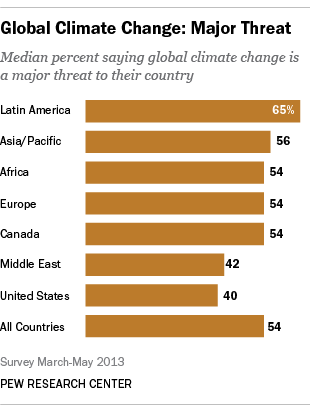
The UN Climate Change Conference convened today in Warsaw with a call for governments to “harness” what it called a “strong groundswell of action” to reach an agreement to cut greenhouse gas emissions. The talks begin against a public opinion backdrop in which fewer Americans see global climate change as a major threat than do people in most other regions.
While a Pew Research Survey last month found 67% of Americans believe there is solid evidence of global warming and 44% of them blame it on human activity, a global survey of 39 nations last spring found that 40% of Americans regarded global climate change as a major threat to the U.S.
By contrast, a median of 54% or more of publics in Canada, Europe, the Asia Pacific, Latin America and Africa saw global warming as a major threat to their countries. Concern was highest in Latin America (65%) and the Asian Pacific (56%). An opening statement at the Warsaw climate conference took particular note of the deadly typhoon that this weekend left many part of the Philippines devastated. Nearly two-thirds in the Philippines (66%) said climate change was a top concern in the spring survey.
The only region in the spring survey where public concern about climate change as a danger was as low as in the U.S. was the Middle East (42%).
In Pew Research’s annual survey in January on the public’s priorities for this year, just 28% cited the need to deal with global warming, putting it at the bottom of the list. Another survey in February found that 34% said it was “essential” for the president and Congress to enact new climate change policies this year while 39% said it could be done in the next few years. About one-fifth (19%) said new climate policies should not be enacted at all.
A Gallup poll conducted in January produced similar findings, although its question was a different one. Asked how much of a priority those surveyed put on enacting “a law increasing government spending to find ways to reduce the effects of climate change,” 22% said it was a top priority, 28% said it was an important priority but not a top one, and 49% responded that it was not an important priority.
When Americans were asked a question in a September survey about a specific policy involving global warming — as opposed to how high they rank it as an overall concern — a big majority (65%) backed putting limits on greenhouse gas emissions from power plants.
